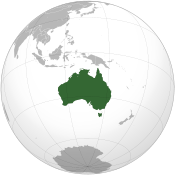Australia announces levy bill to offset cost of Queensland floods
Thursday, January 27, 2011

Image: Kristian Thøgersen.
The Prime Minister of Australia, Julia Gillard has today announced a new bill into Parliament to assist in the Queensland floods recovery. The proposed levy will be a once-off tax, given only to those with an annual income of above $50,000.
Exemptions to the flood relief fund will be given to those who are income earners of less than $50,000 a year or those who were affected by the flood crisis. Anyone earning between the ranges of $50,000 to $100,000 will contribute 0.5 percent of their income whilst anyone earning over $100,000 annually will pay 1 percent.
During her announcement, Gillard stated: "Under this levy, someone who has an income of $60,000 will pay just under $1 extra per week. A person earning $100,000 per year will pay just under an extra $5 per week."
The levy is set to contribute to the relief effort to assist in the five-billion-dollar reconstruction of Queensland infrastructure. The Government will obtain three billion dollars through the scratching of certain schemes and the postponement of others. The levy will then contribute the other two billion.
The bill has not come without criticism. The leader of the opposing Liberal Party, Tony Abbott, has claimed that there is "fat" in the budget. He said there should be no requirement for Australians to contribute towards a levy, but rather the government should cut back on its own spending.
Gillard responded to Abbott's claims by saying that the Liberal's proposed paid maternity leave scheme would have required Australian people to pay a levy, and that it is unjustifiable that they then wouldn’t allow for the rebuilding of Queensland.
Independent Bob Katter has said that until a designated fund for natural disaster relief is established by the Government, he will not approve of any relief levies introduced into parliament. Tony Windsor, a fellow independent, agreed. With Labor currently in a minority government, the passing of the bill is in jeopardy without the support of the independents (which of whom, except for Bob Katter, formed government with Labor).
There is currently no certainty that the bill will be introduced yet. It must first be approved in the Lower House and then in the Senate.
Sources
- Samantha Hawley. "Gillard's flood levy in political limbo" — Australian Broadcasting Corporation, January 27, 2011
- Ben Packham and James Massola. "Wealthier to bear brunt of flood levy as victims, low-paid are exempt" — The Australian, January 27, 2011



